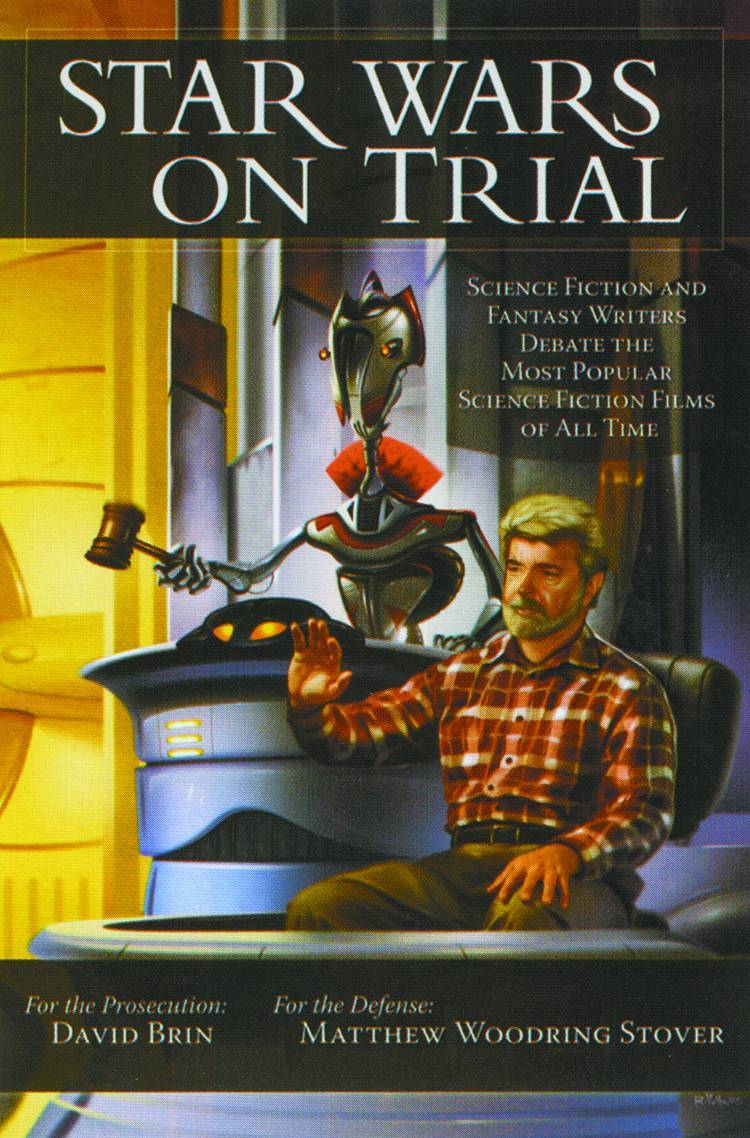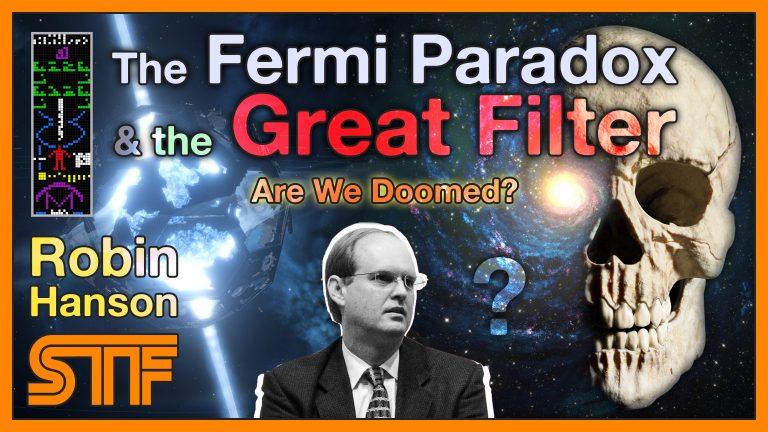Star Wars on Trial – A Feudalistic Fantasia Pushing an Elitist Anti-Democratic Agenda
The Star Wars movie series has been the mainstay of imaginative fiction for children and adults since the mid 70s – many saw it as the gold standard of science fiction. When I was a child I used to collect all sorts of Star Wars paraphernalia – figures of some of the characters, tie & x-wing fighters, and cards that came with bubble gum. Meeting David Brin at a science fiction conference in Los Angeles in 2012 (see resulting interview), and coming across a book he co-edited Star Wars on Trial rooted in an infamous Salon article made me think twice about some of the messages that the Star Wars franchise has so far conveyed. I thought it was a good time to ask David Brin his thoughts on the topic – here is the resulting interview.
– foreword by Adam Ford.
Interview with David Brin
 Adam Ford: What did Yoda mean when he said “Do or do not. There is no try.”?
Adam Ford: What did Yoda mean when he said “Do or do not. There is no try.”?
David Brin: That was just some faux-eastern-mystical gobbledygook that George Lucas insisted upon, amid the otherwise excellent screenplay for The Empire Strikes Back, penned by Leigh Brackett and Laurence Kasden… the one time that George Lucas showed real wisdom and hired experts to do what he clearly cannot. Write.
In fact though, can you name one thing that evil green oven mitt — Yoda — ever says that is verifiably right and wise and the truth? A less “wise” character would be hard to find and no character across all of storytelling history wrought as much death as this nasty creature.
“There is no try”? Bull! Trying is how human beings learn. You have a stab at something. You look at the resulting mess. You send brain signals reinforcing the actions that had good results and gradually repressing those that failed. It is how we improve and become people who are capable of gymnastic gold medals, or astronauting through space, or writing dialogue that actually makes sense.
AF: You mention that George Lucas “has spent the last 20 years relentlessly pissing in modernity’s face, preaching Romantic claptrap about how demigods and mystic warriors are better than democracy.”
DB: JRR Tolkien had a grievance against modernity, but he came by it honestly, at the Battle of the Somme, watching the flower of his generation mowed down by modern implements of death. He saw what coal dust did to the buildings and lungs of London Town. The Lord of the Rings rails against modernity — painting it as a tool of Mordor — while extolling the elfish demigods and mystic chosen-one warriors of Numenor. And it’s great stuff! We are on opposite sides of this argument. But Tolkien is very good and makes his case in a gorgeous story.
In contrast, George Lucas was given everything by modernity… health and fun and riches and all the tools he needed for his dream – to direct movies — to come true. Modernity provides the brilliant artists whom he hires by the bushel-load. When he rails against modernity – along with democracy and science and the hopeful possibilities of the common woman or man – he is simply being an ingrate.
AF: You mentioned in an article at Salon.com that the message George Lucas puts across in Star Wars is : “True leaders are born. It’s genetic. The right to rule is inherited. Justified human emotions can turn a good person evil.”
DB: That’s romanticism, in a nutshell. But it went beyond forbearance with the apotheosis of Darth Vader. The notion that a killer of billions should be forgiven because he saves the life of his own son? Or that Luke was ever in any danger of becoming “evil” just because he got a little angry? Oh my.
AF: Would George Lucas, or anyone for that matter, be a good benign dictator – (by good I mean successfully benign)? If so, how do you pick a correct one?
DB: We all daydream about what laws we would command, if we got to be king. I am no exception. Moreover I admit there have sometimes been good kings. Only look at what happened when their sons took charge. It took a special kind of maturity for George Washington and his band of geniuses to say: “Let us limit our own power. Instead, we’ll ask the people to argue and negotiate with each other.”
The result is noisy, messy, frustrating… and so vastly better and more just and more productive than the preceding 6000 boring years of brutal, nasty feudalism. We are in a revolution. It is ongoing. And science fiction is the one form of literature that says: “look, we can spot mistakes! We can criticize and maybe cooperate. Look at how far we’ve come. Maybe – just maybe – we can go farther.”
AF: You mention “Romanticism is an enemy meme. I think it is deeply contrary to the Enlightenment, and deeply harmful.” – while I like some of the beautiful portrayals, narratives in some art, Rousseau writes wonderfully – it’s the implementation that in the real world that bothers me.
DB: Romanticism can be spectacularly beautiful! As I said, it was the core mythic system across most cultures. But its dark side is promoting endlessly the form of governance that filled those cultures. Feudalism — kings and the priests who pushed kingliness as the best thing.
We are revolutionaries, no less than Washington and Franklin! We can find a way to have the adventure and fun of fantasy without the relentlessly and tediously repeated lessons: that only annointed ones can rule… and that everything must stay the same.
AF: What do you see are the main differences between Fantasy and Scifi? Why are people attracted one more than the other?
 DB: Fantasy is the Mother Genre. Until about 1700, nearly all literature and storytelling, in nearly all cultures, contained elements of the fantastic — demigod heroes who confronted monsters or whole armies, for example. Only with Thackery and Defoe and Balzac and so on did we start to get a very recent fixation on the narrow “here and now.” Both fantasy and science fiction break out of the myopic constraint, positing that things might be different than they are, elsewhere and elsewhen… or else right before our eyes.
DB: Fantasy is the Mother Genre. Until about 1700, nearly all literature and storytelling, in nearly all cultures, contained elements of the fantastic — demigod heroes who confronted monsters or whole armies, for example. Only with Thackery and Defoe and Balzac and so on did we start to get a very recent fixation on the narrow “here and now.” Both fantasy and science fiction break out of the myopic constraint, positing that things might be different than they are, elsewhere and elsewhen… or else right before our eyes.
The difference between these two cousin genres is not – fundamentally – about science and machines versus magic and dragons. Tales like Star Wars seem to revolve around techno wonders like starships and lasers, but the plots and characters and assumptions that weave through that fictional universe are all those of a fantasy tale.
Powerful wizards and kings and chosen-one heroes are the figures who matter. Normal people only get to choose which ubermensch mutant-superman demigod they’ll carry a spear for.
The inherent notion underlying fantasy is romanticism. Feudalism is the natural social order. A hero may fight for one prince over another, but there will be wizards and kings and nothing about that will ever change. In this respect, Star Wars is very similar (though much lower in quality) to the romantic fantasies of Tolkien.
The fundamental premise of good science fiction is inherently different. Things may change — even basic things like the kind of government or how children are raised or what gender roles might be like. A hero isn’t someone who puts the nicer prince on the throne, but someone who empowers ten million kids to lift their gaze and say: “this might all be different.”
AF: What are your hopes for the next three episodes?
DB: That JJ Abrams and his peers actually read Star Wars on Trial. Even if you are a defender of Lucas’s saga, you’d surely want to see the final trilogy avoid earlier mistakes, delivering what we got in The Empire Strikes Back — entertainment and thrills that are also thoughtful and thought provoking and that encourage us to feel that we all might be heroes in a civilization that deserves the name.
Star Wars on Trial: The Force Awakens Edition: Science Fiction and Fantasy Writers Debate the Most Popular Science Fiction Films of All Time
 Star Wars on Trial on Amazon!
Star Wars on Trial on Amazon!
“Order in the Court!
Star Wars: the most significant, powerful myth of the twenty-first century or morally bankrupt military fantasy?
Six films. Countless books. $20 billion in revenue. No one can question the financial value or cultural impact of the Star Wars film franchise. But has the impact been for the good?
In Star Wars on Trial’s courtroom—Droid Judge presiding—Star Wars stands accused of elitist politics and sexism, religious and ethical lapses, the destruction of literary science fiction and science fiction film, and numerous plot holes and logical gaps.
Supported by a witness list of bestselling science fiction authors, David Brin (for the prosecution) and Matthew Woodring Stover (for the defense) debate these charges and more before delivering their closing statements.
The verdict? That’s up to you.
The release of Star Wars: The Force Awakens is the perfect time to look back at George Lucas’ crimes, and new forewords by Brin and Stover discuss the newest generation of Star Wars films and what JJ Abrams must do to live up to—or redeem—the franchise.”
Resources:
[1] http://www.davidbrin.com/starwarsontrial.html [2] http://www.davidbrin.com/starwars1.html [3] https://www.quora.com/What-did-Yoda-mean-when-he-said-Do-or-do-not-There-is-no-try [4] http://www.wired.com/2012/08/geeks-guide-david-brin/all/
Biography of David Brin

David Brin is a scientist, speaker, technical consultant and world-known author. His novels have been New York Times Bestsellers, winning multiple Hugo, Nebula and other awards. At least a dozen have been translated into more than twenty languages.
His 1989 ecological thriller, Earth, foreshadowed global warming, cyberwarfare and near-future trends such as the World Wide Web. His 2012 novel Existence extends this type of daring, near future extrapolation by exploring bio-engineering, intelligence and how to maintain an open-creative civilization.
A 1998 movie, directed by Kevin Costner, was loosely based on The Postman.
Brin serves on advisory committees dealing with subjects as diverse as national defense and homeland security, astronomy and space exploration, SETI and nanotechnology, future/prediction and philanthropy. He has served since 2010 on the council of external advisers for NASA’s Innovative and Advanced Concepts group (NIAC), which supports the most inventive and potentially ground-breaking new endeavors.







